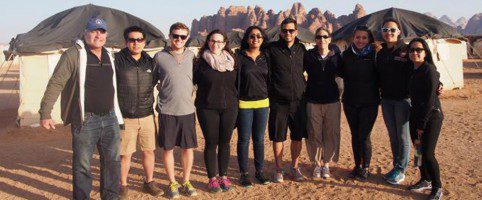Cornell’s Business Impact Symposium Returns, and More – New York News

Let’s explore some of the most interesting stories that have emerged from New York City business schools this week.
Cornell Business Impact Symposium: Bridging Sustainability and Enterprise – Johnson Business Blog
Cornell’s SC Johnson Graduate School of Management Center for Sustainable Global Enterprise hosted this year’s Cornell Business Impact Symposium (CBIS), which featured sustainability experts from the food, fashion, technology, and finance industries. Current MBA students shared their takeaways from the symposium on the Johnson Business Blog.
René Bonomi, MBA ’19, cited the “Combating Climate Change with Clean Energy Innovations” panel as a highlight, which surveyed “trends in the energy industry, such as storage improvement, and illuminating innovative start ups such as Dimensional Energy and Energy.”
Sarah Theobald, MBA ’19, was struck by the “From Fashion to Food: Excursions through Sustainable Supply Chain” panel, which “covered an array of hot topics from supply chain traceability and upcycling to the challenges of measuring social impact as well as reconciling emerging market manufacturing practices with United States corporate standards.”

Left to right; Martie Curran (Nestle Waters), Funlola Otukoya (CDP), Eileen Quigley (NRDC), Michael Van Brunt (Covanta Energy), and Jim Armstrong (Climate Changers) / Photo via johnson.cornell.edu
Read more about this year’s CBIS here.
Podcast: Mark Conrad on the Business of Sports – Gabelli Connect
The American sports industry, somehow, is becoming a bigger monolith than ever before. In fact, Forbes projects the professional sports market in the United States to grow from $60 billion to $73 billion by 2019.
Recently, Fordham University Gabelli School of Business associate professor and sports business concentration director Mark Conrad was a featured guest on a Fordham-produced podcast to discuss his organizational predictions for the NFL, Major League Baseball, and NCAA.
You can listen to the interview with Conrad below and find out more here.
A Summer Class Set in Israel – Rutgers Business School Blog
Rutgers Business School Entrepreneurship professor Gary Minkoff has spearheaded a three-week long summer course entitled Doing Business in Israel, which will “introduce students to the entrepreneurial culture and business world inside Israel,” including local Israeli aerospace, artificial intelligence, biometrics, clean technology cybersecurity, pharmaceutical engineering, robotics, and venture investment industries.
“We’re teaching entrepreneurship and innovation, so why not connect students with places where that’s happening. This course aims to plant many seeds for potential collaborations between Rutgers students and Israeli entrepreneurs and innovators,” Minkoff said.
You can learn more about the course here.
D’Amore-McKim Study Abroad Explores Israel As Innovation Hub

The D’Amore-McKim School of Business at Northeastern University unveiled a new study abroad pilot program that hosted five MBA students on a two-week guided tour of Israel’s past, present, and future this summer. The new International New Venture program, a joint venture between D’Amore-McKim and Ben Gurion University of the Negev, combines “historic and cultural experiences with big business and young start-up visits.”
Cass Executive MBA Talks Israel-Palestine Elective

Core courses are essential to any MBA program. However, it’s the electives that can truly shape a program for the individual. For Harold Okwa, a Modular Executive MBA at Cass Business School City University London, one elective course that stood out was Innovation & Technology in Israel and Palestine.
In a blog post titled “When Innovation is your Only Option,” Okwa explains his choice, saying, “In my opinion, the Israel-Palestine elective was most thought provoking, and it discredited everything I ever knew about the region; Israel using its ‘obsession’ for security to secure itself from its Arab neighbor nations, to Palestine coming to terms with their current realities, both resolving their issues by use of innovation and entrepreneurship to better their future.”
One unique aspect of the elective is that the class took place on the ground in Tel-Aviv and Palestine for a week. For the first three days, Okwa and his classmates visited various companies and organizations throughout Tel-Aviv including the Peres Centre for Peace, the Bridge (Coca-Cola’s accelerator program) and 83 North (a venture capital firm).
“Another exciting part was the panel discussions, where we met a group of female entrepreneurs, angel investors, and different co-founders who were are at various stages of their start-up journey,” Okwa wrote. “These were very enlightening and educational experiences.”
Then, the class traded their Israeli tour guide for an Arab Palestinian guide and they left the West Bank border of Israel to visit Ramallah. For Okwa, it was a stark change. In Ramallah there was no 3G mobile Internet and thanks to subtle changes in roof tops and car number plates, he felt like he had “gone back in time.”
Still, the class met with numerous stakeholders in the technology and innovation ecosystem including co-working accelerator spaces, financial institutions such as the Bank of Palestine, entrepreneurs, and even politicians.
“The highlight of Palestine was visiting Rawabi city, and meeting with the man behind the vision, Bashar Masri, who didn’t hesitate to give us his thoughts on how Ramallah is doing business, his quest to bring development to the people of Palestine, and his thoughts on Israel,” Okwa said.
At the end of the trip, Okwa came back with a unique perspective. He was impressed by how both Israelis and the Palestinians used innovation and technology in an attempt to better their own lives. And, he even got some advice on how to utilize “waste” in his real estate business Vestates as well as how to improve his mobile application for his startup, Jetseta, a luxury transportation app. How a commercial luxury app helps ameliorate one of the world’s most pronounced conflicts involving an often-accused apartheid state remains to be seen, but Okwa’s optimism is strong.
“One of the main takeaways from the elective, is how optimism and innovation have acted as catalyst to the development of both Israel and Palestine (especially in the case of Rawabi city),” Okwa said. “In the words of the late President Peres ‘Optimists and Pessimists die the same way, but live differently.’”
Columbia Business School Surveys Israeli Innovation Against All Odds

The Columbia Business School recently published an article by Sharon Kahn that surveyed Israel’s unusual status as a “hotbed of innovation and small-business growth,” which the “no milk, no honey, no money” country has cemented amidst a host of assorted challenges within its relatively short 68 year-old lifespan.
Zicklin Partners with Israeli School for Dual MBA Program

The Zicklin School of Business has partnered with the College of Management Academic Studies (COMAS) in Israel to launch a new dual MBA program. Students in this program will receive an American MBA from Zicklin and an Israeli degree from the College of Management Academic Studies. COMAS is the first non-subsidized, non-profit academic institution in Israel to be recognized and certified by the Council for Higher Education. The college has grown to be the largest college in Israel.
The program will begin in October 2015. It will be a 15 month long program that will span across four semesters. Three semesters of the dual MBA program will be delivered on the College of Management Academic Studies campus in Israel. Classes in Israel will be held in a half-day format twice a week. The program will also feature an intensive summer semester at the Zicklin School of Business campus in New York City. Classes in New York will be held five days a week over four weeks.
Smith MBAs Consult Projects in the Middle East

Three Smith School of Business MBA students, Patrick Gallice, Carlos Cedeno, and Hirokazu Masuoka, were selected to join a consulting team that traveled to the Middle East over Spring Break, 2015. They studied the feasibility of using greywater for small-scale crop production, assisted in finding solutions to water scarcity in the region, and worked to solve a complex environmental problem that implicates legal, public health, and economic issues.
Continue reading…
